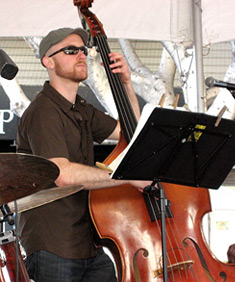A Doctor in the (Jazz) House

George Ban-Weiss, jazz musician and Berkeley engineer. (Photo by Peter Ban and Jesse Lauro)
George Ban-Weiss will soon have a new title to accompany his growing fame in Bay Area jazz circles. The professional bass player is about to become a Ph.D.
Having performed at such venues as Yoshi’s in Oakland, the Jazz Bakery in Los Angeles, and Smalls in New York City, Ban-Weiss (B.S. ’03, M.S. ’05 ME) expects to receive his doctorate in mechanical engineering from UC Berkeley in May. The 27-year-old is wrapping up research exploring emissions from gas and diesel vehicles and their respective impact on air quality. Ban-Weiss juggles his studies with three or more weekly gigs.
“It all just kind of happened. I never pursued music as a career,” says Ban-Weiss, who started playing piano at age three and took up the bass at Davis High School when the bass player in the jazz band graduated. “I learned very quickly there was always a shortage of bass players.” Ban-Weiss now counts Charles Mingus, Wayne Shorter and Frank Zappa among his top musical influences.
Band leader and saxophonist Mitch Marcus says talent plays a big role in Ban-Weiss’s success. “He’s very musical, very intuitive,” says Marcus. “I try to pull him away [for gigs] as much as possible.”
Along with appearances with the Mitch Marcus Quintet, Ban-Weiss performs with such groups as the Mads Tolling Trio and the Realistic Orchestra. A multi-instrumentalist, Ban-Weiss accompanied legendary folksinger Donovan on the cello at a San Francisco concert in 2005.
Time pressures notwithstanding, Ban-Weiss says his alter egos strike a perfect balance in his life. Professor Robert Harley, his doctoral advisor, is “really supportive” of his outside career, while musician friends “tend to think it’s cool” that he’s earning a Ph.D. “The scenes are so different,” observes Ban-Weiss.
Ban-Weiss came to Cal as a freshman in 1999 after considering studies in aeronautics. A pilot since the age of 17, he ultimately decided mechanical engineering would give him more flexibility. Ban-Weiss found little time for gigs until the end of his junior year, when he started accepting regular requests to perform. After graduating in 2003, he did his master’s research on biodiesel emissions. For his Ph.D., Ban-Weiss has studied vehicular pollutants using Oakland’s heavily traveled Caldecott Tunnel as a field lab.
His research, funded by the California Air Resources Board, compared emissions from gas-powered passenger cars to those from heavy diesel trucks. The Caldecott provides an ideal setting for such comparison because its middle bore is limited to passenger cars while the southern bore is open to both cars and diesel trucks.
“Over a time period of a month, we can measure more than 100,000 passenger vehicles and thousands of trucks,” Ban-Weiss says. His study found that diesel truck emissions of nitrogen oxides (NOx), which cause smog and respiratory irritation, have decreased at a slower rate over the last decade than other sources such as passenger cars and power plants, causing them to be the largest source of NOx in the U.S. Ban-Weiss also found that diesel trucks emit over 10 times more NOx and particulate matter than cars per unit of fuel burned. Particulate matter is considered harmful to human health and also contributes to climate change. While regulations intended to reduce emissions from new diesel trucks are being phased in, the impact may be slow given the longevity of diesel engines now on the road, says Ban-Weiss. The study “has direct implications on air quality and climate change,” he notes.
As he wraps up his academics, Ban-Weiss is weighing options for simultaneously pursuing engineering and music. Though both endeavors tap into his creative spirit, Ban-Weiss says the similarities stop there. “In improvising jazz, you can use an error somewhat to your advantage,” he says. “In engineering, an error is never cool.”